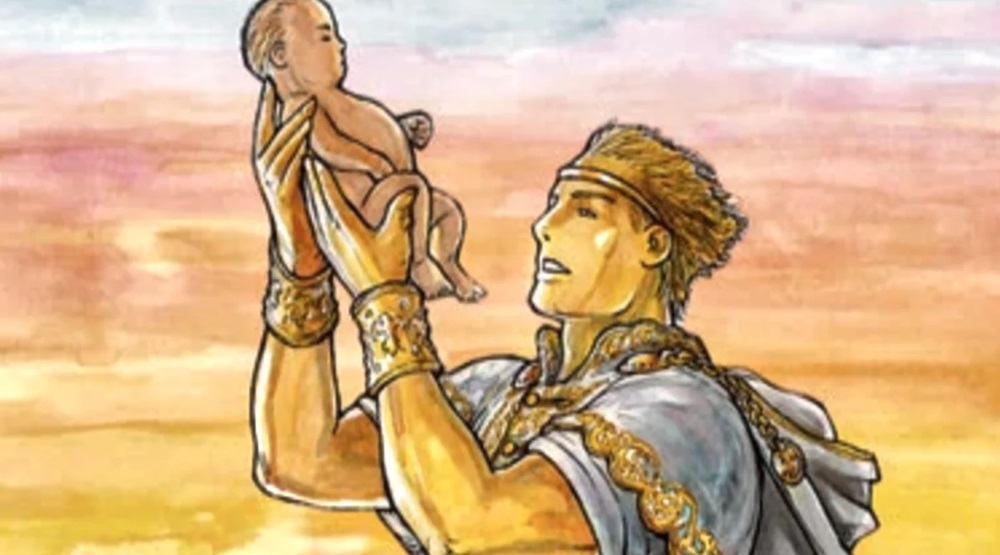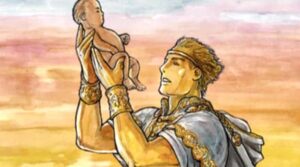Lathander: The Dawn God’s Place in Dungeons & Dragons

Alright, let’s talk about Lathander, the Morninglord, the Dawnbringer, the deity who wakes you up, dusts off your boots, and says, “Today’s a new day.” Seriously, Lathander has that kind of vibe. If you’ve ever ventured into the world of Dungeons & Dragons, you’ve probably heard the name. If not, well, buckle up—this article is about to hit you with divine sunshine.
Now, Lathander is no one-hit wonder. He’s been around for ages, and in the pantheon of D&D gods, he’s got his very own slice of fame. And when I say “fame,” I mean that he’s like the superhero of the gods who gives everyone hope. If you need a fresh start or a little divine push, Lathander’s your guy. Whether you’re a paladin, cleric, or just some player who’s had a rough week (we’ve all been there), Lathander will be there for you like your favorite cup of coffee.
The Origins and Lore of Lathander
Okay, here’s where things get a little mythic. Picture this: Lathander is the god of renewal, life, and creativity. He’s like the morning light that chases away the darkness. I’m not talking about the sunrise you grudgingly face on a Monday morning (I’ve been there, too), but the actual force of life that makes the world bloom again. He’s one of the big shots in the Faerûnian pantheon, but don’t get him confused with some other sun god—Lathander isn’t just about being bright and shiny. He’s about new beginnings, fresh starts, and making stuff happen.
In terms of appearance, think radiant. Like, glowing aura, all that jazz. He’s often depicted as a youthful, glowing figure, sometimes even with a sun or a sunrise behind him. And honestly, who wouldn’t want to look that good in divine art?
I guess I should mention that the origins of Lathander are a bit, well, open to interpretation. It’s all about that cosmic creation stuff. The dawn is said to have chased away the primordial darkness. I can’t say it any clearer than that: Lathander kicked darkness to the curb and said, “Alright, let’s get to work.”
The Tenets of the Morninglord
So, here’s the kicker—Lathander doesn’t just sit around looking pretty (though he totally could). He’s all about change, creativity, and, you know, making things better. His followers? They’re idealists, and honestly, who wouldn’t want to hang out with a bunch of optimists? They believe in the power of transformation and growth, whether that’s in themselves or the world.
Here’s a quick breakdown of his core beliefs. They’re like a mission statement, except way cooler:
- Embrace new beginnings.
- Inspire creativity, whether it’s painting, music, or building things. (Yeah, that’s right, Lathander is down with artists.)
- Fight decay and destruction. If it’s undead or something that spreads despair, it’s going down.
- Bring hope to those who are down and out. Trust me, if you’re feeling stuck, Lathander has a pep talk for you.
I once had a conversation with a bard who was super into Lathander. She swore that if you spoke his name before starting a new project, it would totally succeed. I’m not saying she was right, but, uh, she convinced me to use his name before I started writing this article. So far, so good!
Clerics and Paladins of Lathander
So, you’ve heard about Lathander. But let’s dive deeper into his fan club—his followers, who are literally the best cheerleaders for life. Clerics of Lathander are typically all about that healing life. But, like, imagine a cleric who doesn’t just heal your wounds—they fix your spirit. They’re like a mix of healer and motivational speaker (I’m looking at you, Tony Robbins, but with way more divine power).
Paladins of Lathander? Well, let’s just say they’re ready to smite evil and protect the light like a big, righteous fist of justice. Seriously, their weapons glow with radiant energy—undead stand no chance against their sunrise-inspired smites. I’ve been on the receiving end of a paladin’s smite before (not fun, FYI).
If you play a cleric or paladin of Lathander, here’s how it goes: You’re basically living the “new day, new opportunities” mantra. Your spells? Healing, radiant magic, and a lot of “get out of jail free” cards. When things are rough, you throw down a Beacon of Hope or Daylight and remind your party that everything is going to be okay.
Temples and Rituals Devoted to Lathander
Now, let’s talk about those fancy temples of his. Lathander is one of those gods who likes his temples to be open and filled with light—think big, airy spaces with stained-glass windows catching every ray of sunshine. His worshippers, early risers to the core, meet for daily sunrise services where they pray and give thanks for the new day ahead.
I once visited a Lathander temple in Waterdeep (long story—don’t ask about the time I accidentally set fire to a candle during the morning service, but it wasn’t my fault, okay?). Anyway, the vibe was unreal. The sunlight poured in like a divine spotlight, and for a second, I almost felt like I was going to get an award or something.
Common Rituals:
- Dawn Prayers – Y’all, if you’re waking up before the sun to pray, you better believe there’s some serious devotion going on.
- Sunrise Services – It’s like the church service that sets the tone for your day. If you’re a Lathander follower, this is basically a cosmic pep talk.
- Light Renewal – This one’s about cleansing bad energy and making sure that you’re ready for whatever the day brings.
Anyway, here’s the kicker: these aren’t just rituals; they’re a lifestyle. You’re constantly working toward a better, brighter world. But you don’t have to be a cleric to get in on the action. Even the local baker can swear by Lathander’s influence. Just ask my buddy Rick who runs a bakery down the street. He swears the “Morning Glory Muffins” taste better if you say a prayer to Lathander while you bake them.
Lathander vs. Amaunator: The Controversy
Ah, this one’s a fun little family drama. So, Lathander and another sun god, Amaunator, have this whole “who’s who” thing going on. In some editions of D&D, people thought they were basically the same god. But you know what? It’s complicated—like, too many family members at Thanksgiving complicated.
Fast forward to 4th edition, and Lathander and Amaunator were merged into one. This left fans (and deities) scratching their heads. Later editions brought clarity, saying, “Nah, they’re different!” But hey, if you want to throw in a plot twist for your campaign, maybe your party’s battling with that identity crisis. Honestly, it’s all about your storytelling style.
The Symbolism of Light and Dawn
Now, about Lathander’s whole light thing. It’s a pretty big deal. He’s the god of dawn, of light, and of fresh starts. Seriously, if light was a currency, he’d be rolling in it. For his followers, light isn’t just about being bright—it’s about what the light represents: new beginnings.
There’s a lot of emphasis on radiance, both in spells and in lore. I’ve had a few moments in campaigns where the enemies were straight-up terrified of Lathander’s radiant magic. You know that moment when you see a vampire and you’re like, “Oh, they’re toast”? Yeah, that’s the power of Lathander shining through.
Anyway, back to the game: whenever a follower of Lathander is in battle, it’s like the sun’s on their side. There’s no hiding from that much light.
How to Roleplay a Devotee of Lathander
If you’re diving into the role of a Lathander follower, there are a few things to keep in mind. First off, you’re basically a walking ray of sunshine. You’re not just some random cleric; you’re that cleric. You show up ready to inspire everyone around you and solve problems with creativity. You’re also, let’s be honest, probably way too positive about every situation.
- Always try to look on the bright side of things (even if things are going to hell).
- Be extra—wear golden, radiant clothes, or at least try to.
- Wake up at dawn (or pretend to—it’s a whole vibe).
- Be an encourager. “You’ve got this!” “You can totally do it!” “Go, team!” You know, typical Lathander stuff.
And don’t forget, sometimes you need to drop a little creative flair into your roleplay. When my character had to negotiate with a dragon, I channeled Lathander and promised the dragon a better future (as if a dragon cared about “better futures,” but hey, it worked).
The Role of Lathander in Campaigns
So, let’s talk about how Lathander fits into your campaigns. This guy (or deity) can fuel some serious storylines. Whether you’re questing to find a lost artifact, cleanse a town overrun by undead, or simply need a morale boost, Lathander is here for it.
You might find yourself:
- Defending a town at the break of dawn (perfect timing, right?).
- Restoring a broken temple to its former glory (they say the sun always rises again).
- Taking down undead who can’t seem to get that the whole “life” thing is non-negotiable.
Plot Hooks Involving Lathander:
- “The Relic of Dawn” – A long-lost relic of Lathander is hidden in a forgotten temple.
- “Sunless Days” – The sun has stopped rising, and you’re the only ones who can restore the light.
- “Lathander’s Lost Priest” – A fallen priest of Lathander has gone rogue, and only you can save the day.
Final Thoughts: Why Lathander Matters in D&D
Look, Lathander isn’t just a god of sunshine and feel-good moments. He’s a force for change, optimism, and life itself. He represents everything that makes us keep going, even when life gets tough. Lathander reminds us that every day is a new opportunity. Whether you’re facing down dragons, liches, or just the Monday blues, Lathander is there, cheering you on. And honestly, who wouldn’t want that kind of divine support?




